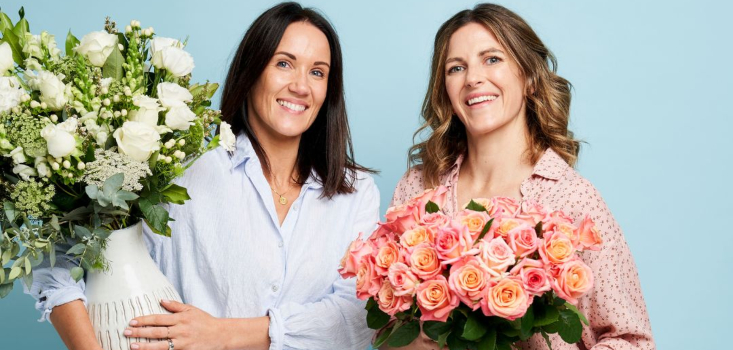
LVLY co-founders Hannah Spilva (L) and Verity Tuck. Source: Supplied.
More Australian brands have given their customers the option to opt out of receiving unwanted Valentine’s Day marketing emails, with online florist and flower delivery business LVLY leading the trend by giving their customers a choice.
LVLY, which delivers Australia-wide, is a collaboration between Melbourne-based co-founders Hannah Spilva and Verity Tuck.
This year marks the third year that LVLY has asked people to temporarily pause marketing around Valentine’s Day messages.
LVLY marketing manager Soniya Cooper confirmed the business will continue to do this around big calendar events such as Mother’s and Father’s Day.
“Lots of businesses talk the talk about being customer-centric but very few walk the walk. Making people happy is why LVLY exists so it stands to reason that we’re driven by empathy and compassion. One of the ways this manifests itself is through our approach to marketing,” she said.
“In 2021 we launched the Thoughtful Marketing Movement — an initiative designed to put customers first by allowing them to temporarily pause marketing around Valentine’s Day messaging and from potentially sensitive marketing messages around big calendar events like Mother’s day and Father’s Day.
“We reached out to brands around Australia to also consider the potentially sensitive effects of sending out particular marketing comms that may upset them — people are going through breakups, or may have lost someone during this time and it might be triggering for them. And for Mother’s and Father’s Day, it’s the ‘don’t forget mum/dad’ type of messages.
“Proactively reaching out to our customers asking them if they’d like to pause marketing that they may find triggering feels like the right thing to do — the human thing to do. It’s what our values of ‘being a goodie’ and ‘making someone’s day’ are all about.”
Cooper says LVLY has been overwhelmed by how positively customers have responded to their approach.
“Our customer service team has been inundated with messages of thanks and support. It’s a great feeling to know that you’re making a positive impact in people’s lives,” she said.
“If you have the right marketing tools it’s not a complex process to set up. It’s a simple sequence of asking customers if they’d like to press pause on communications and then making sure customer segments accurately reflect those preferences. We put a lot of thought into our messaging around this. It’s all about intention, as a business if you feel strongly enough about doing it there are a bunch of ways to make it happen.
“We’re also incredibly proud of how many other brands, particularly retailers, have supported our thoughtful marketing efforts by following suit. It helps raise the collective consciousness of Australian businesses.”
Global online marketplace ETSY also issued an email last month advising customers that if they prefer not to receive Valentine’s Day emails, they could opt out.
Cooper says this Valentine’s Day will undoubtedly be LVLY’s biggest one in its seven-year history.
“Valentine’s Day (and Mother’s Day) are a bit like the grand finale of the flower industry, there’s so much energy and preparation for calendar events,” she said.
“We’ve seen extremely strong growth this year and pre-sales for Valentine’s Day are trending ahead of where we thought they’d be. It’s fair to say Team LVLY will be very busy making lots of wonderful people smile this weekend and sharing the love!
“Our theme this year is ‘Share the lvly’ — not just with your romantic partner (even though they’d absolutely adore it), but with the other loves in your life too — your kids, besties, parents, dog — we know you love them all, so why not use the one chance you get to be all heartfelt and mushy to tell them that you love them too?”
Beep Media digital producer Andrew Wrathall says brands should target their marketing messages towards specific segments of their customer list.
“Sending a campaign to customers who are not interested can often put them off a product or service. A company can find and target a specific segment by looking at data from a rewards program, from the interests they’ve selected on the newsletter sign-up, or through customer surveys. Or simply by looking at previous purchases. I’m interested in the use of AI to figure out the type of customer more easily by what they purchase,” he said.
“When I send out a marketing campaign, I try to be sure that the people who want to hear about my product or service have chosen to receive that email by signing up online. I used to send out campaigns from a book-industry company, which focuses on a niche group of book lovers, so I know that sending a campaign to someone with no interest in books is useless.
“When the company’s narrative aligns with a customer’s own values, the customer is more likely to purchase the product. As a consumer who has a partner, I know I have to be aware of Valentine’s Day, but still, I don’t like a huge bombardment of ads kind of shouting at me to buy Valentines-related products. So there’s that too. I might want to opt out of Valentine’s ads.
“Also, if you send too many campaigns to people not interested in a product, they’ll click unsubscribe. Mail delivery platforms such as MailChimp penalise the sender with a suspension if the emails get a huge percentage of unsubscribes. A Valentine’s Day email might cause single fed-up people to click ‘unsubscribe’.”
Handpicked for you

Anti-Tesla ad airs during Super Bowl as part of Senate campaign



COMMENTS
SmartCompany is committed to hosting lively discussions. Help us keep the conversation useful, interesting and welcoming. We aim to publish comments quickly in the interest of promoting robust conversation, but we’re a small team and we deploy filters to protect against legal risk. Occasionally your comment may be held up while it is being reviewed, but we’re working as fast as we can to keep the conversation rolling.
The SmartCompany comment section is members-only content. Please subscribe to leave a comment.
The SmartCompany comment section is members-only content. Please login to leave a comment.